Covid-19 vaccine: 'I'm wary about my second jab'
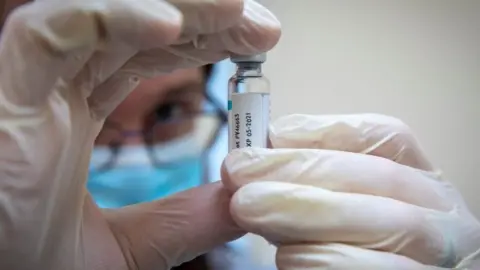 Getty Images
Getty ImagesThree weeks ago, Barbara received the text she had been dreading. It read: "You have been invited to book your first Covid-19 vaccination." Instead of feeling a sense of relief, a tingle of excitement mixed with trepidation, she mainly felt anxious. She put her phone away without clicking on the link. "It's my body, my choice," she thought.
"I don't think it's been out long enough for long-term effects to be known. It just doesn't sit right with me. Now there's talk of blood clots, I am more scared to have the vaccine than not," she said.
The UK's medicines watchdog, the Medicines and Healthcare products Regulatory Agency (MHRA), has said that evidence "does not suggest" the jab causes clots.
But there are striking disparities in the take-up of the Covid-19 vaccine across London, new figures from NHS England have revealed. Tower Hamlets and Newham have the lowest rate in those aged over 60, but the borough that stands out most is Southwark, where Barbara lives.
Depending on whether people live in a rich or poor neighbourhood in this part of south London, there is a marked difference in how likely they are to have the vaccine - one of the biggest such differences anywhere in England.
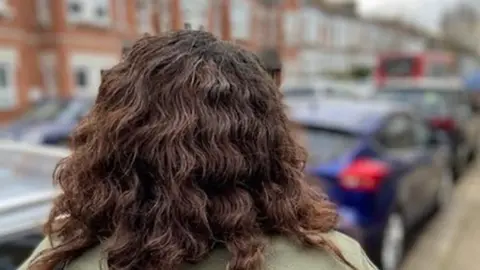
"I do talk about the vaccine with my neighbours, and watch the debates," Barbara, 52, explained. "I would never tell anyone whether to have it or not. It's their choice. I just don't trust it."
Southwark, which is home to about 315,000 people, has one of the lowest take-up rates for the vaccine in England, at 73% of those aged 60 and above.
In the Peckham area, less than 70% of people aged 60 and above have had the vaccine. In wealthier parts of Southwark, such as Dulwich and Herne Hill, that rises to 95%.
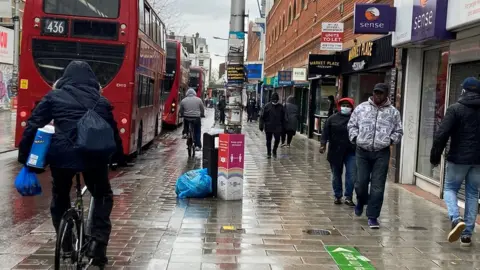
The reasons for hesitancy over taking the vaccine can be complex, but ethnic background and where people live both play a part.
Prof Kevin Fenton, Public Health England's regional director for London, said the lack of confidence in vaccines in the capital was far higher in economically disadvantaged areas, and varies across different ethnic groups.
"We are seeing a relatively low uptake in black communities, a little better in south Asian communities, and definitely best in white communities across the city."
This is important, he added, because "we have a situation where communities that have been most affected by the pandemic are the communities which are more hesitant to take up the vaccine.
"It means infection will spread and it will be transmitted to people who are most vulnerable, causing severe disease and death."
Dr Rosemary Leonard, a GP based in West Dulwich, a wealthier part of the borough, said some people in Southwark had to travel further to get the vaccine, which can put many off.
She said there was also an "ethnicity poverty trap". When the vaccinations started, she observed all ethnicities getting the jab. But that changed as the age eligibility lowered from the very oldest people entitled to have it.
"The 60 to 70-year-olds are more reluctant," she said. "When people thought they needed it to travel, they got keener. For those who can't afford to get on a plane, there's less of an incentive."
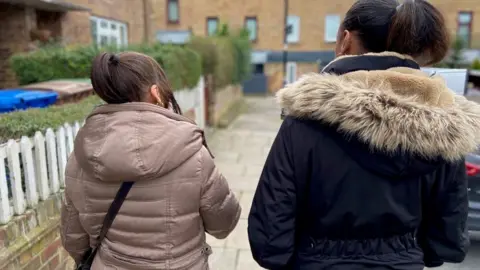
Jacqueline, 67, was visiting her daughter, having had her first dose of the vaccine three weeks ago. She said reading articles about the AstraZeneca vaccine being being halted in some countries, because of concerns about blood clots, had made them both feel hesitant.
"I'm in two minds about having the second jab," she said. "It's made me feel wary. I know the numbers are low. I probably will have it though as I want to travel."
Her daughter Lisa, 42, lives near Peckham and said she would not be taking the vaccine yet. "I'm just going to wait and see. I'm concerned hearing about blood clots and side effects. I'm not saying I'd never have it, but I'd rather more people had the vaccine first."
Peckham mother-of-three Kirsty tweeted that she'd had the jab at the weekend. "Sore arm, headache, needed a nap. Had the best night's sleep in ages. I was more at risk from blood clots when I was pregnant, even more post C-section. I don't regret any of those choices either."
The government together with UK's medicines watchdog, the MHRA, has said the evidence "does not suggest" the jab causes clots. Health Secretary Matt Hancock has urged people to "listen to the regulators" and get the jab as soon as they have the opportunity.
The concerns of some people, particularly among the borough's black communities, are ones that church leaders, Southwark Council and other public bodies have been working to address through online meetings for residents.
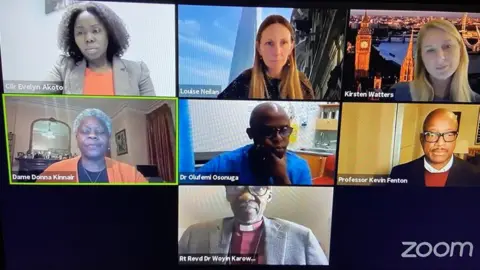
The council's deputy director of public health, Kirsten Watters, spoke to Peckham residents this week. She said she was troubled "seeing the differences between ethnic groups taking up the vaccine" and urged people to "have conversations with their GPs".
In answer to concerns over suggested links between the AstraZeneca jab and blood clots, she emphasised there was "no evidence to suggest that one leads to another".
Blood clots can occur naturally. Evidence from 10 million doses given in the UK shows there have been three cases - none fatal. More than 24 million people in the UK have now received the first dose of a coronavirus vaccine, according to government figures.
The European Medicines Agency (EMA) is expected to issue a decision on the continued use of the vaccine later on Thursday after 13 countries paused their use of it.
For Barbara, a grandmother with an underlying health condition, there is no budging - not yet anyway.
"There is a little bit of doubt, and maybe I'm making the wrong decision," she said. "I just don't want to be forced and don't think I should be penalised for not having it."
